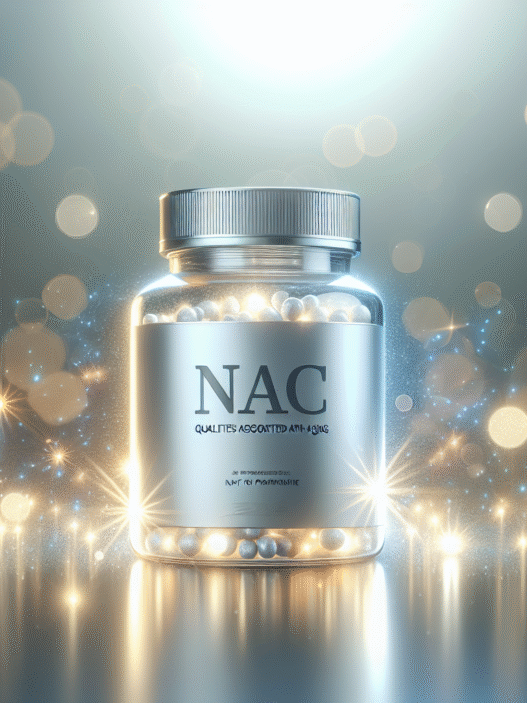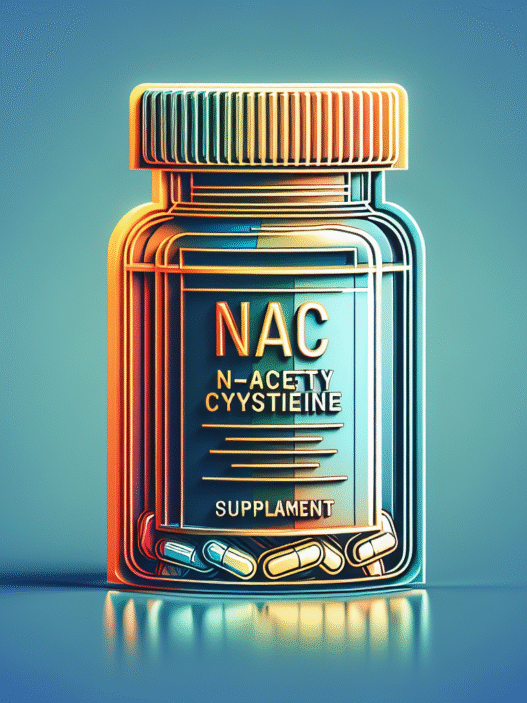Understanding NAC for Anti-Aging
Introduction to N-Acetyl Cysteine (NAC)
N-Acetyl Cysteine, commonly referred to as NAC, is a synthetic derivative of the amino acid cysteine. It is recognized for its powerful antioxidant properties and ability to replenish intracellular levels of glutathione, a crucial antioxidant that combats oxidative stress. This compound has gained popularity not only for its health benefits but also for its promising potential in anti-aging therapies.
Recent research highlights NAC’s role in improving age-related conditions. In various mouse models, it has shown efficacy in managing issues such as age-related hearing loss and memory decline. Clinical trials underscore NAC’s potential benefits in treating aging-related diseases including Alzheimer’s, type 2 diabetes, cardiovascular diseases, and even certain types of cancer.
| Characteristic | Description |
|---|---|
| Chemical Composition | Synthetic derivative of cysteine |
| Main Benefits | Antioxidant properties, supports glutathione production, potential in anti-aging |
| Common Uses | Supplement for various health conditions |
Significance of NAC in Anti-Aging
The significance of NAC in the realm of aging lies in its multifaceted benefits that target both the physical and cognitive aspects of health. By enhancing the body’s antioxidant defenses, NAC helps mitigate oxidative stress, which is a major contributor to the aging process.
Oxidative stress occurs when free radicals overwhelm the body’s ability to neutralize them, leading to cellular damage. This damage is linked to many age-related conditions. NAC’s ability to boost glutathione levels aids in protecting cells from this damage, promoting cellular integrity and longevity.
Moreover, through its potential in preventing or slowing down the progress of diseases associated with aging, NAC serves not only as a valuable supplement but also as a preventative agent. Its applications extend to addressing cognitive health and offering benefits for overall longevity. For those seeking to enhance their wellness and tackle age-related issues, NAC is emerging as a significant player in the field of anti-aging. For more information about the various benefits of NAC, check our article on n-acetyl cysteine benefits.
This insight into NAC highlights its critical role in the pursuit of a healthier, longer life, making it an attractive option for longevity seekers. For more in-depth exploration on the topic, refer to our piece on nac supplement anti-aging.
Health Benefits of NAC
N-Acetyl Cysteine (NAC) offers various health benefits that may contribute to anti-aging and improved overall well-being. This section highlights three key benefits: balancing blood sugar, enhancing brain function, and improving lung function.
Balancing Blood Sugar
NAC has shown promise in balancing blood sugar levels, especially in individuals with insulin resistance. Studies indicate that NAC may improve insulin sensitivity, aiding in the regulation of blood sugar levels. This is particularly relevant for individuals with conditions like polycystic ovary syndrome (PCOS), which can disrupt blood sugar control.
In recent research, NAC has significantly reduced levels of inflammatory factors such as IL-6 and high-sensitivity C-reactive protein (hs-CRP) in obese adults over a four-week period. By lowering these inflammatory markers, NAC may help regulate blood sugar effectively.
| Study Focus | Result |
|---|---|
| Effects on Insulin Resistance | Improved insulin sensitivity in PCOS patients |
| Inflammation Reduction | Decrease in IL-6 and hs-CRP levels in obese adults |
Enhancing Brain Function
NAC plays a crucial role in enhancing brain function due to its antioxidant properties. It helps combat oxidative stress, which is often associated with age-related cognitive decline. By increasing levels of glutathione, a powerful antioxidant, NAC may protect brain cells from damage and improve overall cognitive function. This can be particularly beneficial for aging individuals looking to maintain mental acuity.
Research has indicated that NAC supplementation may provide neuroprotective effects, making it a potentially valuable component in strategies aimed at preventing neurodegenerative conditions.
Improving Lung Function
NAC has been recognized for its positive impact on lung health. It acts as a mucolytic agent, helping to thin mucus in the airways and making it easier to expel. This can be particularly beneficial for individuals suffering from chronic respiratory conditions such as chronic obstructive pulmonary disease (COPD) or cystic fibrosis. By improving lung function, NAC may enhance quality of life and support overall health, especially for those concerned about longevity.
| Benefit | Effect |
|---|---|
| Mucolytic Action | Thins mucus in respiratory pathways |
| Lung Health | Improves lung function in chronic respiratory conditions |
The multifaceted benefits of NAC extend beyond simple supplementation. Its effects on blood sugar regulation, brain function, and lung health make it a valuable addition to any health regimen focused on anti-aging and overall wellness. For more detailed information on the benefits of NAC, check our article on n-acetyl cysteine benefits.
NAC for Disease Prevention
N-Acetyl Cysteine (NAC) has gained attention for its potential role in disease prevention, particularly concerning neurodegenerative conditions and cancer treatment. Its unique properties may offer benefits beyond just anti-aging.
Potential Benefits for Neurodegenerative Conditions
NAC helps to refill glutathione levels in the body, control neurotransmitters, lessen inflammation, and protect cells needed for brain health. These functions could benefit individuals with neurodegenerative conditions such as Alzheimer’s and Parkinson’s diseases. The evidence suggests that NAC may support brain function and protect cognitive health by combating oxidative stress and reducing inflammation (WebMD).
| Function | Potential Benefits |
|---|---|
| Replenishing Glutathione | Maintains antioxidant defense |
| Controlling Neurotransmitters | Supports cognitive function |
| Reducing Inflammation | Protects brain cells |
| Combating Oxidative Stress | Reduces cellular damage |
NAC demonstrates protective activity against oxidative stress, potentially offering benefits related to neurodegenerative diseases. Its multifaceted action suggests a significant role in preserving brain health, making it a valuable supplement for longevity seekers concerned with cognitive decline.
Role in Cancer Treatment
While NAC shows promise in various health areas, it has a limited amount of evidence supporting its benefits in cancer treatment. Some studies suggest that NAC may have favorable effects on cancer by preventing some forms of cellular damage. However, more robust research is needed to validate its efficacy in cancer prevention and management (WebMD).
| Research Focus | Implications |
|---|---|
| Cellular Protection | May reduce risk of certain cancers |
| Usage in Treatment | Limited evidence, requires more study |
In summary, NAC may serve as a supportive agent in disease prevention, particularly for neurodegenerative disorders. Its potential role in cancer treatment, while promising, necessitates further investigation. For more details on the benefits of this supplement, check out our article on n-acetyl cysteine benefits.
NAC and Oxidative Stress
N-Acetyl Cysteine (NAC) plays a significant role in combatting oxidative stress, which is a key factor in the aging process. This section will explore NAC’s antioxidant and anti-inflammatory properties as well as its role in the production of glutathione, a vital compound for maintaining cellular health.
Antioxidant and Anti-inflammatory Properties
NAC is renowned for its powerful antioxidant and anti-inflammatory properties. It helps in the elimination of cell-damaging free radicals, which can lead to various health issues, including heart disease, diabetes, and infertility (WebMD). By neutralizing these harmful compounds, NAC reduces oxidative stress in the body, thereby contributing to overall health and longevity.
Research indicates that NAC can significantly lower inflammation markers by inhibiting the activity of nuclear factor kappa B (NF-κB), a key regulator of inflammatory responses. This action leads to decreased levels of tumor necrosis factor-alpha (TNF-α) and interleukins (IL-6 and IL-1β) that are associated with chronic inflammation.
Production of Glutathione
One of the most crucial functions of NAC is its ability to increase the production of glutathione (GSH), a vital antioxidant in the body. Glutathione plays an essential role in maintaining cellular redox balance, detoxifying harmful substances, and protecting against oxidative damage (PMC).
| Function | Description |
|---|---|
| Increases GSH Levels | Enhances the intracellular concentration of glutathione, aiding in detoxification. |
| Protects Cells | Shields cells from oxidative damage and maintains cellular integrity. |
| Supports Immune Function | Aids the immune system by reducing oxidative stress. |
By boosting glutathione levels, NAC helps combat the effects of aging and supports various bodily functions, underpinning its potential as a supplement for those seeking anti-aging benefits. For more information about the benefits of NAC, visit our article on n-acetyl cysteine benefits.
Utilizing NAC as part of a health regimen can contribute to improved health and longevity, making it an essential component for individuals concerned about oxidative stress and its associated risks.
Potential Interactions and Risks
N-Acetyl Cysteine (NAC) is widely recognized for its health benefits and anti-aging properties. However, potential interactions and risks should be considered by individuals, especially those who are concerned about liver health or detoxification.
Interactions with Medications
NAC can interact with various medications, particularly those that also slow blood clotting. When combined with anticoagulants, such as warfarin or aspirin, NAC may increase the risk of bruising and bleeding due to its blood-thinning effects. It is essential for individuals taking these medications to consult with a healthcare professional before adding NAC to their regimen.
Medications That May Interact with NAC:
| Medication Category | Potential Interaction |
|---|---|
| Anticoagulants | May increase risk of bleeding |
| Nitroglycerin | Increased risk for individuals with bleeding disorders |
| Other blood-thinning medications | Enhanced effects leading to increased bruising |
Individuals with conditions such as cystinuria (a genetic disorder that affects kidney function) should also take precautions, as NAC might exacerbate their condition. Consulting a healthcare professional is recommended for anyone considering NAC, particularly if they have underlying health issues.
Possible Side Effects
While NAC is generally considered safe, it may cause side effects in some individuals. Common side effects include:
| Side Effect | Description |
|---|---|
| Nausea | Some users report feeling queasy after taking NAC |
| Diarrhea | Gastrointestinal discomfort may occur in some users |
| Abdominal pain | Discomfort in the abdominal area has been noted |
These side effects are typically mild but can be bothersome. If they persist or worsen, individuals should seek medical advice.
In summary, while NAC offers many benefits related to anti-aging and overall health, users should be mindful of its potential interactions with medications and possible side effects. Before incorporating NAC into a health regimen, especially for those concerned with nac for anti-aging, a discussion with a healthcare professional is advisable to ensure safety and effectiveness.
Research Studies on NAC
Clinical Trials and Findings
Recent studies have highlighted the potential benefits of N-Acetyl Cysteine (NAC) for various health conditions, particularly its impact on obesity-related complications. A randomized clinical trial involving 40 obese adults investigated the effects of NAC on senescence in visceral adipose tissue. Participants received 600 mg of NAC or a placebo for four weeks. The findings indicated that NAC significantly reduced senescence activity in visceral adipose tissue, as reflected in decreased expression of p16 and interleukin 6 (IL-6) genes when compared to the placebo group.
NAC administration was also associated with reductions in inflammatory markers such as IL-6 and high-sensitivity C-reactive protein (hs-CRP). Additionally, improvements in metabolic health were observed, specifically in fasting blood sugar (FBS) levels, homeostatic model assessment of insulin resistance (HOMA-IR), and insulin levels, adjusting for confounding factors. However, no significant effects were noted on lipid profile parameters with NAC supplementation.
Effects on Obesity and Senescence
NAC offers promise in addressing the challenges associated with obesity and related metabolic disorders. The recent clinical trial findings support the idea that NAC may help improve insulin sensitivity and secretion in obese individuals, thus potentially playing a role in weight management and overall metabolic health. The significant decrease in senescence markers indicates that NAC could assist in combating age-related changes in adipose tissue, which may contribute to obesity complications.
These insights align with ongoing research into the broader implications of NAC for aging and health management. For those seeking to explore the benefits of NAC further, additional resources, including n-acetyl cysteine benefits, nac supplement benefits, and nac supplement anti-aging, provide a deeper understanding of how NAC may contribute to longevity and overall health.





















